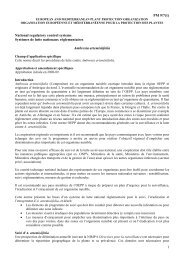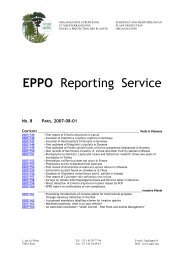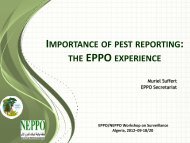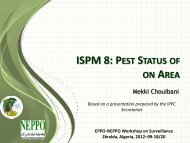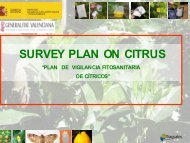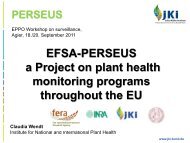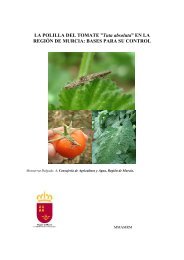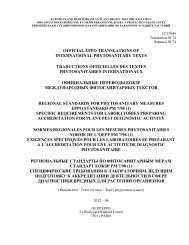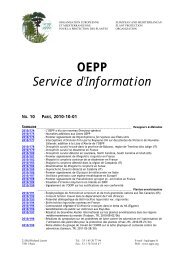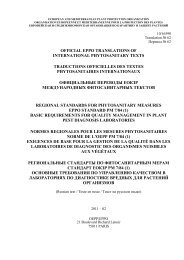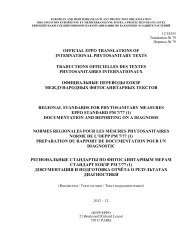EPPO Reporting Service - Lists of EPPO Standards - European and ...
EPPO Reporting Service - Lists of EPPO Standards - European and ...
EPPO Reporting Service - Lists of EPPO Standards - European and ...
You also want an ePaper? Increase the reach of your titles
YUMPU automatically turns print PDFs into web optimized ePapers that Google loves.
2010/004 First record <strong>of</strong> Tuta absoluta in Germany<br />
<strong>EPPO</strong> <strong>Reporting</strong> <strong>Service</strong> – Pests & Diseases<br />
The NPPO <strong>of</strong> Germany recently informed the <strong>EPPO</strong> Secretariat <strong>of</strong> the first record <strong>of</strong> Tuta<br />
absoluta (Lepidoptera: Gelechiidae – <strong>EPPO</strong> A2 List) on its territory. The pest was found in<br />
Baden-Württemberg during a monitoring programme which was carried out from<br />
September to October 2009. Pheromone traps were placed in tomato crops, central<br />
markets, <strong>and</strong> packing stations. In total, 27 adults were caught in pheromone traps.<br />
T. absoluta was caught in 1 central market, 1 packing station, <strong>and</strong> 4 production sites. All<br />
infested production sites were located near central markets <strong>and</strong> packing stations, or were<br />
sites where additional tomatoes had been regularly brought from Italy, the Netherl<strong>and</strong>s<br />
<strong>and</strong> Spain. It is thought that T. absoluta has been introduced with consignments <strong>of</strong><br />
tomatoes from infested countries. At the infested production sites, tomato plants are<br />
subject to destruction measures.<br />
The pest status <strong>of</strong> Tuta absoluta in Germany is <strong>of</strong>ficially declared as: Transient, only in<br />
some areas, actionable, under surveillance.<br />
Source: NPPO <strong>of</strong> Germany, 2009-12.<br />
Additional key words: new record Computer codes: GNORAB, DE<br />
2010/005 Tuta absoluta found in Piemonte region, Italy<br />
In Italy, Tuta absoluta (Lepidoptera: Gelechiidae – <strong>EPPO</strong> A2 List) was first reported in<br />
spring 2008 in Calabria, <strong>and</strong> then on tomato crops in several other Italian regions (<strong>EPPO</strong> RS<br />
2009/023, 2009/106 <strong>and</strong> 2009/153, 2009/172). The NPPO <strong>of</strong> Italy recently informed the<br />
<strong>EPPO</strong> Secretariat <strong>of</strong> the first detection <strong>of</strong> T. absoluta in Piemonte region. During a<br />
monitoring programme, T. absoluta was caught (on pheromone traps) in glasshouse tomato<br />
crops in the municipalities <strong>of</strong> Pecetto Torinese (Torino province), Beinasco (Torino<br />
province), Fossano (Cuneo province), Ceresole d’Alba (Cuneo province), Asti (Asti province)<br />
<strong>and</strong> Aless<strong>and</strong>ria (Aless<strong>and</strong>ria province). In addition, several specimens were caught in a<br />
large fruit <strong>and</strong> vegetable market in Torino, <strong>and</strong> in the premises <strong>of</strong> a company transforming<br />
tomato fruits in Pozzolo Formigaro (Aless<strong>and</strong>ria province).<br />
The situation <strong>of</strong> Tuta absoluta in Italy can be described as follows: Present, first found in<br />
2008, now reported from Abruzzo, Calabria, Campania, Lazio, Liguria, Sardegna,<br />
Sicilia, Piemonte, Puglia, Umbria, <strong>and</strong> Veneto, under <strong>of</strong>ficial control.<br />
Source: NPPO <strong>of</strong> Italy, 2009-12.<br />
Additional key words: detailed record Computer codes: GNORAB, IT<br />
2010/006 Anoplophora glabripennis found again in Germany<br />
The NPPO <strong>of</strong> Germany recently informed the <strong>EPPO</strong> Secretariat that Anoplophora<br />
glabripennis (Coleoptera: Cerambycidae – <strong>EPPO</strong> A1 List) has been found again in Nordrhein-<br />
Westfalen. It can be recalled that in 2005 <strong>and</strong> again in 2007, A. glabripennis had been<br />
detected near Bornheim (Nordrhein-Westfalen) <strong>and</strong> subjected to eradication measures<br />
(<strong>EPPO</strong> RS 2008/095).<br />
On 2009-08-14, 3 heavily infested Acer platanoides cv. ‘Globosum’ were found in a private<br />
property in Alfter (Nordrhein-Westfalen). The trees showed bore holes, shoot wilting <strong>and</strong><br />
3



